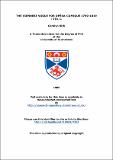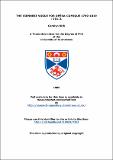Files in this item
The Viennese vogue for opéra-comique 1790-1819
Item metadata
| dc.contributor.advisor | Branscombe, Peter | |
| dc.contributor.author | Kirk, Carolyn | |
| dc.coverage.spatial | 2 v. (456, 374) p. | en_US |
| dc.date.accessioned | 2015-08-19T08:53:52Z | |
| dc.date.available | 2015-08-19T08:53:52Z | |
| dc.date.issued | 1985 | |
| dc.identifier | uk.bl.ethos.259367 | |
| dc.identifier.uri | https://hdl.handle.net/10023/7282 | |
| dc.description.abstract | In the mid-eighteenth century, Vienna, like other European cities, began to manifest the influence of modern French culture; In 1752, a troupe of French players was appointed to the Austrian court to entertain the aristocracy. Four years later, links were forged between the Parisian and Viennese stages via Favart who corresponded with Count Durazzo in Vienna and sent opera scores and suggestions about personnel. In 1765 problems with finance and leadership led to dismissal of Vienna's first French troupe but others performed there for shorter periods between 1765 and 1780. Opera-comique was introduced to Vienna by French players. Occasional performances of opera-comique in German translation took place in Vienna during the 1770s. When, in 1778, the Nationalsingspiel was founded, French opera formed part of the repertoire because of a lack of good German works. A renewed interest in opèra-comique began in about 1790 when fear of revolutionary France and the reigns of Leopold and Franz led to a return of interest in Italian opera at the court theatres, and the virtual disappearance of opêra-comique from its repertoire. Once an aristocratic entertainment, opera-comique now enjoyed popularity at the suburban theatres. Many recent and historically important French operas were performed in Vienna during the next thirty years, putting Italian opera temporarily out of fashion and having an important influence on the emergent German Romantic opera. After 1802 the Theater an der Wien and the court theatres engaged in serious competition. Over 120 French operas were performed in Vienna between 1790 and 1819. Printed French scores and textbooks were purchased from Paris; they were hastily translated by salaried members of the Viennese theatres. Before 1790 Viennese versions of operas-comiques had usually remained close to the originals. Later, in order to make them more appealing to Viennese audiences, the opera texts and music were often altered. Authentic performance was not a concern of the theatres. After 1803, following successful Viennese premieres of several great operas by Mehul and Cherubini, Vienna was flooded with operas by lesser men whose entertaining texts and tuneful music were good for the box office. The vogue for French opera caused some resentment among German musicians, though few contemporary German operas could match the popularity of the French ones. Opera-comique reminded a Viennese public nourished during the eighteenth century mostly on Italian opera, of the literary importance of opera. Viennese interest in op6ra-comique began to decline in 1816 with the rise to fame of Rossini. By 1820 Italian opera was back in fashion. | en_US |
| dc.language.iso | en | en_US |
| dc.publisher | University of St Andrews | en |
| dc.subject | Literature | en_US |
| dc.subject | Mass media | en_US |
| dc.subject | Performing arts | en_US |
| dc.subject.lcc | ML1723.V5K5 | |
| dc.title | The Viennese vogue for opéra-comique 1790-1819 | en_US |
| dc.type | Thesis | en_US |
| dc.type.qualificationlevel | Doctoral | en_US |
| dc.type.qualificationname | PhD Doctor of Philosophy | en_US |
| dc.publisher.institution | The University of St Andrews | en_US |
This item appears in the following Collection(s)
Items in the St Andrews Research Repository are protected by copyright, with all rights reserved, unless otherwise indicated.


